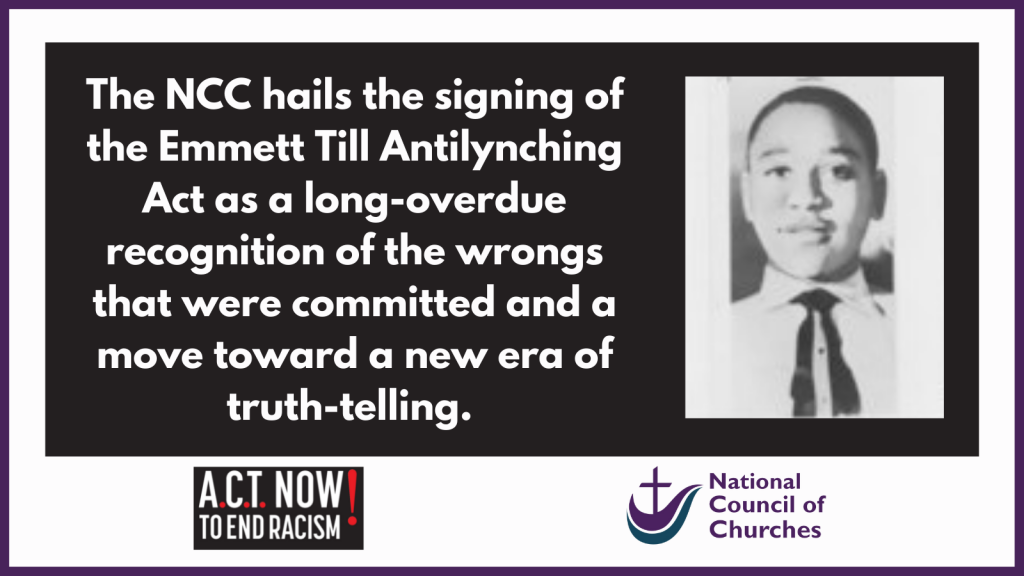
“There are six things that the Lord hates,
seven that are an abomination to him:
haughty eyes, a lying tongue,
and hands that shed innocent blood,
a heart that devises wicked plans,
feet that hurry to run to evil,
a lying witness who testifies falsely,
and one who sows discord in a family.”
Proverbs 6:16-19 NRSVue
The National Council of the Churches of Christ in the USA (NCC) extols the signing of the Emmett Till Antilynching Act by President Joe Biden on March 29, 2022. The long-overdue Act has made lynching a federal hate crime offense. The bill imposes criminal penalties ranging from a fine to up to 30 years in prison for anyone who conspires to commit “a hate crime offense that results in death or serious bodily injury or that includes kidnapping or an attempt to kidnap, aggravated sexual abuse or an attempt to commit aggravated sexual abuse, or an attempt to kill.”
The Act’s namesake, Emmett Till, was a 14-year-old boy when he was murdered in 1955 while visiting his relatives in Mississippi. He was kidnapped and beaten before his body was dumped in the Tallahatchie River. Historians note that even though clear evidence indicated two white men committed the crime, an all-white jury did not find the men guilty after only one hour of deliberation.
The NCC cannot ignore the fact that it took the United States over a century to outlaw lynching. The first antilynching legislation was introduced in 1900 by Rep. George Henry White of North Carolina, the only Black lawmaker at the time, but it never advanced out of committee. U.S. Representative Bobby L. Rush, a sponsor and negotiator of the Emmett Till Antilynching Act, noted that over 200 attempts have been made since that time to pass an antilynching law.
For America to take more than 100 years to make the terrorism of lynching illegal speaks volumes about the racism that permeates every part of our society. We cry out in anguish when we see the historical evidence that lynchings were public spectacles commemorated with photographs on postcards, often with white Protestant churchgoers participating, and recognize that the trauma and threat of these acts continue each day. Although the worst of the Jim Crow era of lynching has ended, we know current-day lynching still manifests itself in America. We witness the continuation of racial lynching in America when a Black teen, Travon Martin, is killed while walking home after buying iced tea and candy; a Black man, Ahmaud Arbery, is killed while jogging; and a Black woman, Rekia Boyd, is killed when socializing with friends in a park.
As part of our ACT Now to End Racism initiative, the NCC challenges our member denominations and our communities to join in truth-telling, leading to actions that right the wrongs, and, with God’s grace, bring healing and wholeness to all people and unity to the nation. We hail the signing of the Emmett Till Antilynching Act as a long-overdue recognition of the wrongs that were committed and a move toward a new era of truth-telling.
Although we cannot erase the terror that lynching has imposed on every Black American since the end of chattel slavery, we call on our churches to acknowledge this pain from our nation’s past while taking an active role in the process of healing and joining the fight for justice in every present instance of lynching. We pray that the unending strength from our faith in Christ will unify us in this struggle and bring us to victory over racial violence.
